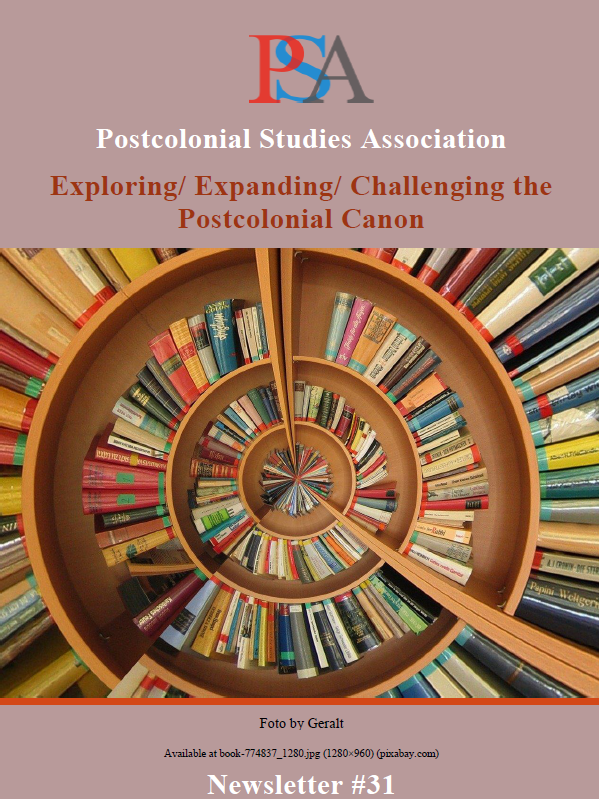The PSA Newsletter #31 focuses on the theme “Exploring/ Expanding/ Challenging the Postcolonial Canon”, which will invite readers to ask crucial questions about both the limits of the label “postcolonial” and the criteria that determine a literary work as part of the “canon” of postcolonial literature. Following a letter to the Association’s members with updates from the PSA’s Executive Committee, the issue continues with eight original contributions. Aminat Emma Badmus opens the newsletter with an exploration of Akwaeke Emezi’s Dear Senthuran: A Black Spirit Memoir to decolonise and “Africanise” Western gender conceptions and the queer literary genre, while simultaneously re-centring Non-Western queer subjectivities. Yeisil Peña Contreras draws attention to Abya Yala and African contemporary literatures written by women and plays emphasis on how the “post” in postcolonial insufficiently addresses the tension between the past and present, arguing instead for multiplicity and a non-linear conception of time. Ramisha Rafique turns her attention to the Palestinian context and engages with Mohammed El-Kurd’s poetry collection Rifqa, in order to show how the poetic medium can become a productive site for creative activism, self-representation and resistance to ongoing colonialism. Duane Long focuses on the colonial history of Ireland and explores a series of editorials of the Irish-language journal An tUltach, which were published after the 1921 partition, in order to engage with the complexities of Irish identity in Norther Ireland. Paolo D’Indinosante engages with Daljit Nagra’s poetry to assess the relevance of Nagra’s verse to postcolonial studies, while also reflecting on the poet’s generally overlooked relationship with Rudyard Kipling’s oeuvre. Luis García-Vela and Jesse Bair argue for the expansion of the postcolonial canon in order to include, respectively, marginalised literary works such as Hispano-Maghrebi poetry and cinematic products such as the quintology Planet of Apes the colonial/postcolonial lesson of which needs further critical exploration. Continuing this conversation, the section on original contributions concludes with Esti Sugiharti’s suggestion that Kevin Kwan’s novel Sex and Vanity would be a rich addition to the postcolonial canon as the author appropriates a canonical text of the Western tradition to expose and critique ongoing racist and colonial attitudes.
Next, readers can find Amira Farhani’s book review of Women and Resistance in the Maghreb: Remembering Kahina (2022), a recent volume on women’s creative voices across the Maghreb during the period of post-independence edited by Nabil Boudraa and Joseph Ohmann Krause. This issue also features two reports: a report by Farzana Qureshi on the “Decolonising the Discipline” event hosted by the English Association and the Institute of English Studies, University of East Anglia, which took place on the 18th of December 2023, and Annemarie Schunke’s report on her research visit to the University of the West Indies in Barbados to support her doctoral research on the reception of classical antiquity in Anglophone postcolonial Caribbean literature of the twenty-first century. This research activity was supported by the Postcolonial Studies Association through the General Research Fund scheme.
The final section of the newsletter includes information about the call for the next issue and useful contacts.
Happy reading!
Francesca and Jennifer
This content is restricted to subscribers


You must be logged in to post a comment.